M8U2 He lives in the east of the US.
- 格式:ppt
- 大小:5.74 MB
- 文档页数:38
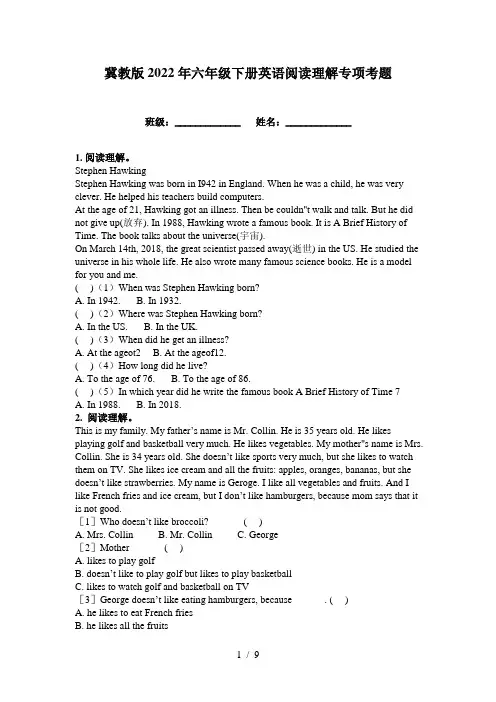
冀教版2022年六年级下册英语阅读理解专项考题班级:_____________ 姓名:_____________1. 阅读理解。
Stephen HawkingStephen Hawking was born in I942 in England. When he was a child, he was very clever. He helped his teachers build computers.At the age of 21, Hawking got an illness. Then be couldn''t walk and talk. But he did not give up(放弃). In 1988, Hawking wrote a famous book. It is A Brief History of Time. The book talks about the universe(宇宙).On March 14th, 2018, the great scientist passed away(逝世) in the US. He studied the universe in his whole life. He also wrote many famous science books. He is a model for you and me.( )(1)When was Stephen Hawking born?A. In 1942.B. In 1932.( )(2)Where was Stephen Hawking born?A. In the US.B. In the UK.( )(3)When did he get an illness?A. At the ageot2B. At the ageof12.( )(4)How long did he live?A. To the age of 76.B. To the age of 86.( )(5)In which year did he write the famous book A Brief History of Time 7A. In 1988.B. In 2018.2. 阅读理解。
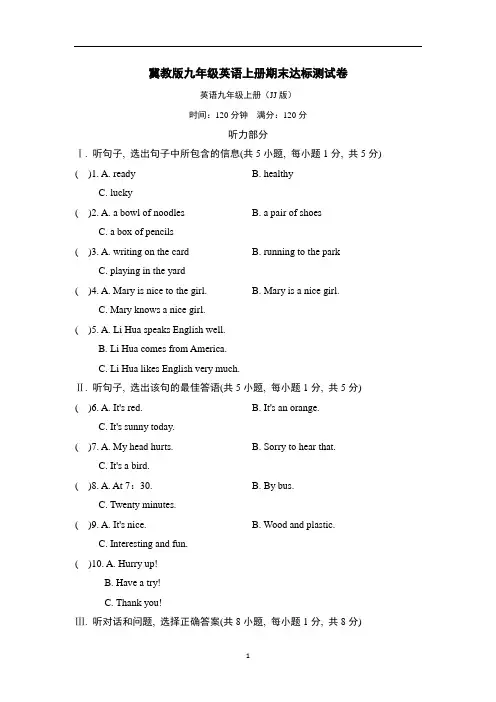
冀教版九年级英语上册期末达标测试卷英语九年级上册(JJ版)时间:120分钟满分:120分听力部分Ⅰ. 听句子, 选出句子中所包含的信息(共5小题, 每小题1分, 共5分) ()1. A. ready B. healthyC. lucky()2. A. a bowl of noodles B. a pair of shoesC. a box of pencils()3. A. writing on the card B. running to the parkC. playing in the yard()4. A. Mary is nice to the girl. B. Mary is a nice girl.C. Mary knows a nice girl.()5. A. Li Hua speaks English well.B. Li Hua comes from America.C. Li Hua likes English very much.Ⅱ. 听句子, 选出该句的最佳答语(共5小题, 每小题1分, 共5分) ()6. A. It's red. B. It's an orange.C. It's sunny today.()7. A. My head hurts. B. Sorry to hear that.C. It's a bird.()8. A. At 7:30. B. By bus.C. Twenty minutes.()9. A. It's nice. B. Wood and plastic.C. Interesting and fun.()10. A. Hurry up!B. Have a try!C. Thank you!Ⅲ. 听对话和问题, 选择正确答案(共8小题, 每小题1分, 共8分)()11. What does Tom think is the most popular drink?()12. Who did the boy write a poem for?**************************()13. Where does Mike think he lost his earphones?A. On the bus.B. In the library.C. At the airport.()14. How does the girl help Mike?A. By finding him his earphones.B. By lending him her earphones.C. By buying him new earphones.()15. What will Mike do tonight?A. Visit a supermarket.B. Watch a movie.C. Meet his sister.**************************()16. What's John doing?A. Doing his homework.B. Doing an experiment.C. Watching TV.()17. What's the experiment about?A. The problem on sleeping.B. The difficulty of study.C. The harm of smoking to the lungs.()18. How often do they have the experiment?A. Three times a week.B. Twice a week.C. Every day.Ⅳ. 听短文和问题, 选择正确答案(共7小题, 每小题1分, 共7分)()19. What is the book A Friend like Henry about?A. A sick girl.B. A family dog.C. A man's travel.()20. How did Tony feel after reading Twenty Thousand Leagues Under the Sea?A. Moved.B. Relaxed.C. Bored.**************************()21. What can't Cindy attend on Thursday?A. The New Year's party.B. A welcoming party.C. A birthday party.()22. What happened to Cindy's brother?A. He hurt his leg.B. He had a headache.C. His arm hurt.()23. Who is in Shanghai now?A. Cindy's father.B. Cindy's mother.C. Cindy's sister.()24. How long will Cindy's brother stay in the hospital?A. For about four days.B. For about five days.C. For about six days.()25. What did Cindy ask Tony to do?A. Sing a song for Sarah.B. Make a cake for Sarah.C. Give the gift to Sarah.Ⅴ. 听短文填空(共5小题, 每小题1分, 共5分)笔试部分Ⅵ. 单项选择(共10小题, 每小题1分, 共10分)()31. —I want to call my mother. But I can't find my mobile phone.—Don't worry. My brother's phone is here. You can use ____.A. theirsB. mineC. hersD. his()32. The man ____ came to our party with a gift is my good friend.A. whichB. whoseC. whoD. whom()33. It's too cold outside. Please keep the door ____.A. closeB. closedC. openD. opened()34. —Hi, Ann. Do you know where your English teacher Mr. Liu is?—He ____ be in the classroom. It's the English class now.A. canB. mustC. mayD. need()35. You won't fully experience the culture of a foreign country ____ you go there in person.A. becauseB. unlessC. as soon asD. as long as()36. Please ____ the tall buildings if there is an earthquake.A. run intoB. catch up withC. get on withD. keep away from()37. —How do we turn on the camera?—I ____ you. Weren't you listening?A. tellB. am tellingC. have toldD. will tell()38. Paper ____ in ancient China about 2, 000 years ago.A. inventedB. was inventedC. inventD. is invented()39. I ____ the dishes, so I didn't answer your call in time.A. washB. washedC. am washingD. was washing()40. —I just came back from Shanghai Disneyland. Can you guess ____?—I've no idea. But I've heard everything there is quite expensive.A. how I came back homeB. how many days I stayed thereC. when I came back homeD. how much I paid for the Mickey Mouse toyⅦ. 完形填空(共10小题, 每小题1分, 共10分)Norman Bethune is one of China's most famous heroes, but he wasn't Chinese —he was Canadian. He gave his life to helping the Chinese people.Norman Bethune __41____ born in 1890. He became a __42____ in 1916, and he went to the front to look after injured(负伤的) soldiers in the First World War. He saw many soldiers die in the war. Later he invented new treatments to __43____ soldiers, and medical tools to use outside hospitals.In 1938 he came to treat(治疗) the Chinese soldiers in the mountains, north of Yan'an. There were __44____ doctors, so he had to work very hard. He opened hospitals to give treatment to local people and soldiers, and to train doctors and nurses. He also wrote books so that doctors could learn about new treatments.Dr. Bethune worked very hard without stopping to __45____. Once, he performed operations __46____ 69 hours without stopping, and saved over 100people. He __47____ working in spite of (尽管) cutting his hand during an operation. In the end, he died because he did not take care of his __48____.Dr. Bethune's work with the Chinese soldiers made __49____ a hero in China. There are books and films about him, and he is __50____ remembered in both Canada and China.()41. A. is B. was C. has been D. be()42. A. doctor B. nurse C. teacher D. worker()43. A. understand B. believe C. help D. count()44. A. little B. few C. much D. many()45. A. rest B. act C. agree D. think()46. A. from B. since C. with D. for()47. A. allowed B. continued C. forgot D. stopped()48. A. face B. leg C. foot D. hand()49. A. his B. he C. him D. one()50. A. still B. never C. hardly D. regularlyⅧ. 阅读理解(共15小题, 每小题2分, 共30分)AA beautiful princess cried because she dropped her golden ball in the well(井).Frog: Why are you so sad, beautiful princess?Princess: My favourite golden ball fell into the well.Frog: I can get it for you, but first, you must promise(承诺) to take me home and be my friend.(The princess didn't want to be friends with a frog, but she promised anyway. When the frog brought her the ball, she hurried home!)Frog: What a selfish princess! I'm certain that she has forgotten her promise. I'll just hop over to the castle to remind her.Princess: What are you doing here, Frog?Frog: Dear princess, I am here to remind you of the promise you made.(The princess shut the door with a big BANG. )King: I heard a door slam. What's happening? If you made a promise, you musthonor it.(The princess was angry but obeyed her father. So, the king, the princess, and the frog enjoyed dinner together. )Frog: I was hungry, but now I'm full. Thank you for the dinner. Kindly show me to my bed now.(The princess did as she was asked, but the frog looked sad!)Frog: You have welcomed me into your home, but I can tell that you don't want to be my friend.(The princess's face went red, for what the frog said was true. She bent down to kiss the frog, but ended up kissing a prince. )Frog: I am a prince who was turned into a frog, and your kiss turned me back. Thank you, dear friend!()51. Who made the gold ball fall into the well?A. The frog.B. The king.C. The princess.D. The prince.()52. What is the right order of what the princess did in the story?①She went back to the castle.②She bent down to kiss the frog.③She got help from the frog and made a promise.④She obeyed her father and ate the meal with the guest.A. ②④③①B. ③④①②C. ③①④②D. ④③②①()53. What can we learn from the story?A. It is often difficult to keep a friendship.B. We are always afraid of making friends.C. Once you make a promise, you must keep it.D. We shouldn't ask for help when we are in trouble.BOn the first school day, Socrates told his students, “Today, we'll only learn one thing. That is to stretch your arms, and then try to swing them backward. ” He showedthem and as a result, all the students laughed. “Sir, is it also needed to be learned?” one of the students asked.“Of course! You think this is a simple thing, but it is difficult,” Socrates replied seriously. Hearing this, the students laughed even harder.Without being a little angry, Socrates said, “In this class I'll teach you how to learn this action well. After that, and from today on, you will do it 100 times a day. ”Ten d ays later, Socrates asked, “Who still sticks to swinging his arms?” About 80% of the students put up their hands. Twenty days later, Socrates asked again, and about 50% of them raised their hands. Three months later, Socrates asked again, “Who still sticks to that simple action of swinging?” This time, only one student raised his hand. He was Plato, the great thinker.Perseverance(坚持不懈) is the simplest yet most difficult thing in the world, because everyone can do it, but not everyone will stick to it. Only the one who can hold on to a simple thing may make it!()54. What did all the students think of what Socrates asked them to do?A. Very interesting.B. Too simple.C. So exciting.D. Very difficult.()55. How often did Socrates ask his students to do the action of swinging?A. 100 times 10 days.B. 100 times 3 months.C. 100 times 20 days.D. 100 times a day.()56. Why did Socrates ask his students to do the simple action?A. To keep his students healthy.B. To let them learn the skill of the action.C. To let them develop perseverance.D. To let them take up a new hobby.CThe Chronicles of NarniaC. S. Lewis, the UKIt's a series of seven books. The stories are about Narnia, amysterious(神秘的) land where animals walk and trees can talk.Humans sometimes enter this world by chance. Kids who go toNarnia in the adventure stories meet all kinds of magicalcreatures(生物), including witches(女巫) and giants. In each bookthere is a battle between two sides—one that wants to turn Narnia into a hell; the other that wants the land to stay the way it is. The kid heroes join the battle. They help the ruler of Narnia, the lion Aslan, defend the country.The Dangerous Book for BoysConn Iggulden & Hal Iggulden, the UKIt tells the story of a middle-class family. The father Patrick was aninventor. After his death, Patrick's family found hope in a book hewrote for his children. It was a childhood guide. This book tells youhow clouds form, how to make a battery, and how to build the greatestpaper airpla ne in the world. Read about how to put together the “toolbox”. Learn about the world's greatest battles and the history of weapons(武器). It is one of the best-selling books for every boy from eight to eighty.The Daring Book for GirlsAndrea J. Buchanan & Miriam Peskowitz, the USFor every girl with independent(独立的) spirit, here is the guideto everything from schoolyard games to great women in history! Thebook gives you ideas for exciting and fun girlhood. Every girl cantake part! What does the book contain? Twenty books every girlshould read, cool tricks with a basketball, building a campfire,queens of the ancient world, science projects, friendship bracelets(手镯) and the secrets of what boys are thinking!()57. In the book The Chronicles of Narnia, who is ruling Narnia?A. A witch.B. A giant.C. A kid hero.D. The lion Aslan.()58. Which of the following might NOT be in the book The Dangerous Book forBoys?A. How clouds form.B. How to make weapons.C. How to build a paper plane.D. How to make a battery.()59. Which author's nationality is different from the others?A. Andrea J. Buchanan.B.C. S. Lewis.C. Conn Iggulden.D. Hal Iggulden.()60. If you are interested in stories about risks, you can read ____.A. The Daring Book for GirlsB. The Dangerous Book for BoysC. The Chronicles of NarniaD. all the three booksDHave you ever watched a TV show about the wild? A shark(鲨鱼) eats a seal(海豹)! Lions run down a gazelle(羚羊)! Is all nature all about eating and blood?There are some living things that will take small pieces of another living thing's body. Parasitism(寄生) is when one living thing gets its energy from another living thing, does not give anything back, and hurts the thing it's taking things from.Sometimes a living thing will live with another living thing without hurting it. It does not steal anything. Commensalism(共栖) is when two living things live together and one gets good things while the other is not hurt by it. Have you seen a picture of a whale(鲸) with white rocky things stuck to its skin? Those are barnacles(藤壶). They attach themselves to the whale, so nothing will try to eat them and they can eat things that float by.Mutualism is when two living things work together and both get good things. Bees and flowers are the most common example. Without flowers, bees could not make honey. Without bees, flowers could not make new seeds. It's a win-win situation for these two. There are lots of animals that get along. Birds will live on the backs ofzebras and eat the ticks(蜱) that are drinking the zebras' blood. Birds get food. Zebras get their ticks taken away. In some of these cases, one animal could not live without the other.We use the word “symbiotic(共生的)” for all of these kinds of relationships. Sometimes it's good for one and bad for the other. Sometimes it's just good for one. Sometimes it's even good for both. So, it is nice to know that there are some living things out there that are finding ways to live together. We could pay attention to the animals that do not always make it on TV.()61. The writer mentioned a TV show about the wild in Paragraph 1 to ____.A. tell a storyB. solve a mysteryC. introduce a subjectD. discuss a programme()62. Which of the following words best describes the relationship between bees and flowers?A. Neighbours.B. Friends.C. Strangers.D. Partners.()63. The underlined word Mutualism in Paragraph 4 probably means ____.A. work together as a teamB. get good things by hurting the otherC. live together to hurt each otherD. run after each other and get food()64. How does the writer develop the passage?A. By showing pictures.B. By giving examples.C. By presenting reasons.D. By drawing conclusions.()65. What can we infer from the passage?A. The world of living things remains to be explored.B. More steps should be taken to protect living things.C. TV programmes about living things need to be improved.D. More money will be spent on documentaries about living things.Ⅸ. 任务型阅读(共5小题, 每小题2分, 共10分)Healthy eating habits can help you feel better and have more energy. They can also control your weight and reduce the risks of certain diseases. Follow these simpletips and start eating healthily.Eat more fruits and vegetables every day. They provide vitamins and other nutrients that our bodies need. Choose a variety of fruits and vegetables and try to create a rainbow of colours on your plate. Half of your plate should be made up of fruits and vegetables.Buy products that are in season and grown in local areas whenever possible. Fruits and vegetables that are in season have better flavour and more nutrients, and most of the time they are cheap. If you can afford them, organic(有机的)fruits and vegetables are always better for your health and the environment.Drink lots of water. Liquid, especially plain water, is necessary for good health. Water transports(输送) nutrients within your body and helps you get rid of(摆脱) toxins(毒素)and waste. The sugary drink, soda, and juice don't provide many nutrients. You need to get used to drinking unflavoured water. The more you drink it, the better your body will be.Once you start eating more healthily, your body will be thirsty for fresh and natural ingredients more and more. Don't forget to get your body moving and spare time to exercise. If you stick to these tips, you will be healthier.66题完成句子;67、68题简略回答问题;69题找出本文主题句;70题将文中画线句子译成汉语。
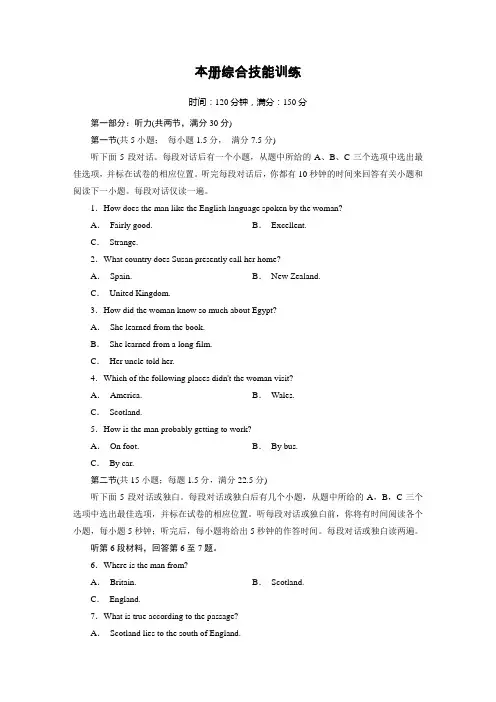
本册综合技能训练时间:120分钟,满分:150分第一部分:听力(共两节,满分30分)第一节(共5小题;每小题1.5分,满分7.5分)听下面5段对话。
每段对话后有一个小题,从题中所给的A、B、C三个选项中选出最佳选项,并标在试卷的相应位置。
听完每段对话后,你都有10秒钟的时间来回答有关小题和阅读下一小题。
每段对话仅读一遍。
1.How does the man like the English language spoken by the woman?A.Fairly good.B.Excellent.C.Strange.2.What country does Susan presently call her home?A.Spain. B.New Zealand.C.United Kingdom.3.How did the woman know so much about Egypt?A.She learned from the book.B.She learned from a long film.C.Her uncle told her.4.Which of the following places didn't the woman visit?A.America. B.Wales.C.Scotland.5.How is the man probably getting to work?A.On foot. B.By bus.C.By car.第二节(共15小题;每题1.5分,满分22.5分)听下面5段对话或独白。
每段对话或独白后有几个小题,从题中所给的A,B,C三个选项中选出最佳选项,并标在试卷的相应位置。
听每段对话或独白前,你将有时间阅读各个小题,每小题5秒钟;听完后,每小题将给出5秒钟的作答时间。
每段对话或独白读两遍。
听第6段材料,回答第6至7题。
6.Where is the man from?A.Britain. B.Scotland.C.England.7.What is true according to the passage?A.Scotland lies to the south of England.B.Scotland is a part of Britain.C.Scotland lies to the east of England.听第7段材料,回答第8至9题。
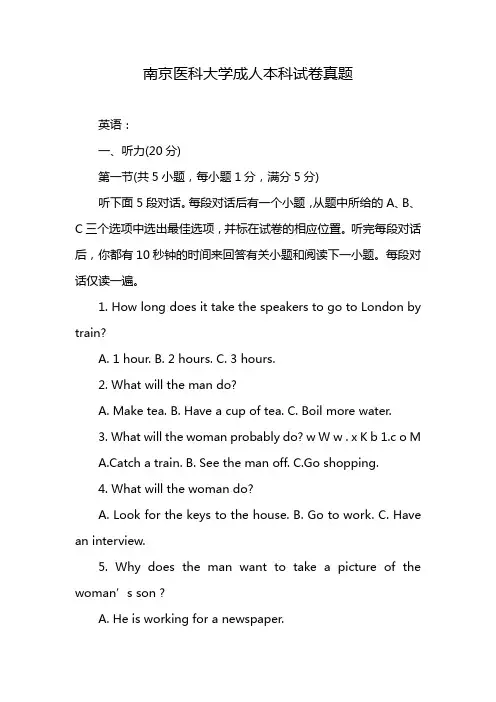
南京医科大学成人本科试卷真题英语:一、听力(20分)第一节(共5小题,每小题1分,满分5分)听下面5段对话。
每段对话后有一个小题,从题中所给的A、B、C三个选项中选出最佳选项,并标在试卷的相应位置。
听完每段对话后,你都有10秒钟的时间来回答有关小题和阅读下一小题。
每段对话仅读一遍。
1. How long does it take the speakers to go to London by train?A. 1 hour.B. 2 hours.C. 3 hours.2. What will the man do?A. Make tea.B. Have a cup of tea.C. Boil more water.3. What will the woman probably do? w W w . x K b 1.c o MA.Catch a train.B. See the man off.C.Go shopping.4. What will the woman do?A. Look for the keys to the house.B. Go to work.C. Have an interview.5. Why does the man want to take a picture of the woman’s son ?A. He is working for a newspaper.B. He is taking photos for a book.C. The woman’s son is very lovely.第二节(共15小题;每小题1分,满分15分)听下面5段对话或独白。
每段对话或独白后有几个小题,从每题所给的A、B、C三个选项中选出最佳选项,并标在试卷的相应位置。
听每段对话或独白前,你将有时间阅读各个小题,每小题5秒钟;听完后,各小题将给出5秒钟的作答时间。
每段对话或独白读两遍。
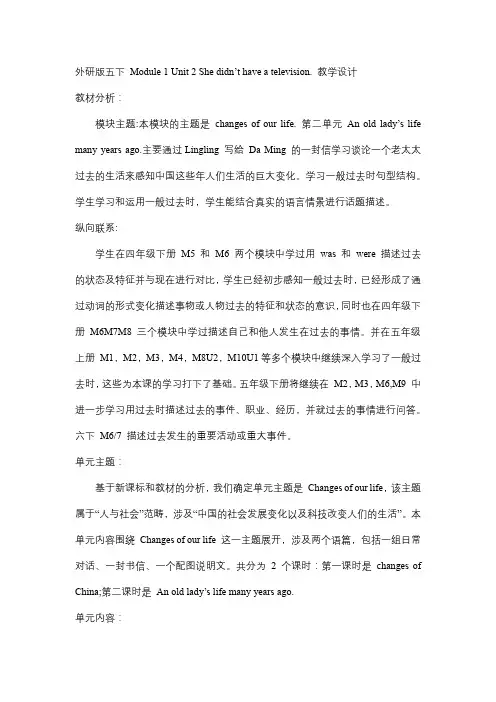
外研版五下Module 1 Unit 2 She didn’t have a television. 教学设计教材分析:模块主题:本模块的主题是changes of our life. 第二单元An old lady’s life many years ago.主要通过Lingling 写给Da Ming 的一封信学习谈论一个老太太过去的生活来感知中国这些年人们生活的巨大变化。
学习一般过去时句型结构。
学生学习和运用一般过去时,学生能结合真实的语言情景进行话题描述。
纵向联系:学生在四年级下册M5 和M6 两个模块中学过用was 和were 描述过去的状态及特征并与现在进行对比,学生已经初步感知一般过去时,已经形成了通过动词的形式变化描述事物或人物过去的特征和状态的意识,同时也在四年级下册M6M7M8 三个模块中学过描述自己和他人发生在过去的事情。
并在五年级上册M1,M2,M3,M4,M8U2,M10U1等多个模块中继续深入学习了一般过去时,这些为本课的学习打下了基础。
五年级下册将继续在M2,M3,M6,M9 中进一步学习用过去时描述过去的事件、职业、经历,并就过去的事情进行问答。
六下M6/7 描述过去发生的重要活动或重大事件。
单元主题:基于新课标和教材的分析,我们确定单元主题是Changes of our life,该主题属于“人与社会”范畴,涉及“中国的社会发展变化以及科技改变人们的生活”。
本单元内容围绕Changes of our life 这一主题展开,涉及两个语篇,包括一组日常对话、一封书信、一个配图说明文。
共分为 2 个课时:第一课时是changes of China;第二课时是An old lady’s life many years ago.单元内容:本节课我们学习的是第二课时An old lady’s life many years ago。
本单元的课文内容是在英国的Lingling 给在中国的朋友Da Ming 写了一封信,信的内容主要介绍了Lingling 昨天观看的一个关于中国的电视节目,主要通过衣食住行四个方面介绍了一个中国老太太过去生活的面貌,最后Lingling 在信的末尾表达了自己的思乡之情。
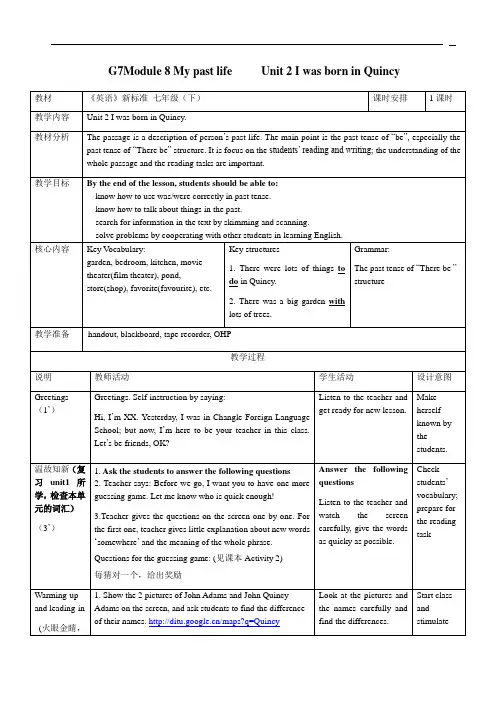
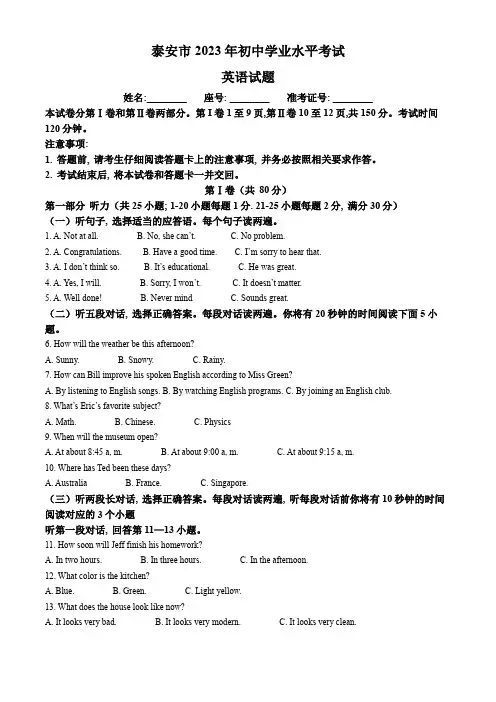
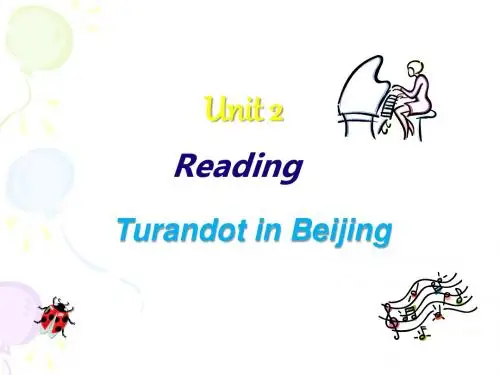
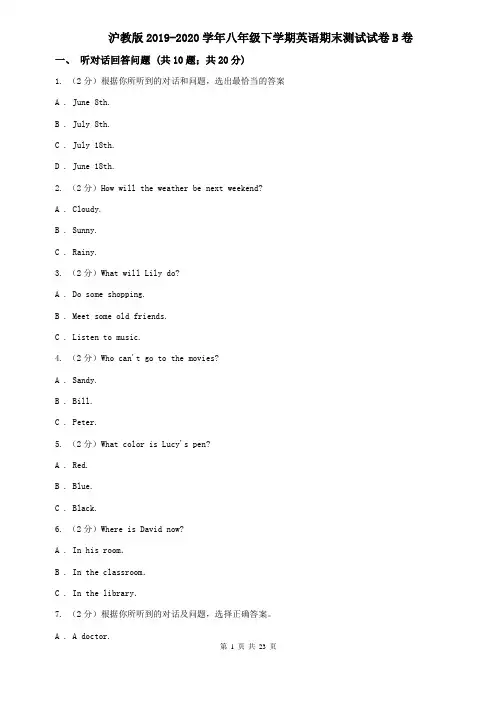
沪教版2019-2020学年八年级下学期英语期末测试试卷B卷一、听对话回答问题 (共10题;共20分)1. (2分)根据你所听到的对话和问题,选出最恰当的答案A . June 8th.B . July 8th.C . July 18th.D . June 18th.2. (2分)How will the weather be next weekend?A . Cloudy.B . Sunny.C . Rainy.3. (2分)What will Lily do?A . Do some shopping.B . Meet some old friends.C . Listen to music.4. (2分)Who can't go to the movies?A . Sandy.B . Bill.C . Peter.5. (2分)What color is Lucy's pen?A . Red.B . Blue.C . Black.6. (2分)Where is David now?A . In his room.B . In the classroom.C . In the library.7. (2分)根据你所听到的对话及问题,选择正确答案。
A . A doctor.B . A teacher.C . A farmer.8. (2分)How often does Mary eat chips?A . Every day.B . Once a week.C . Twice a week.9. (2分)What doesn't the boy need to make his favorite fruit salad?A . Some apples.B . Some bananas.C . Some watermelon.10. (2分)据所听到的内容选择正确答语()A . By shaking hands.B . By bowing.C . By kissing her.二、听对话和短文回答问题 (共3题;共21分)11. (6分)听对话,回答问题。
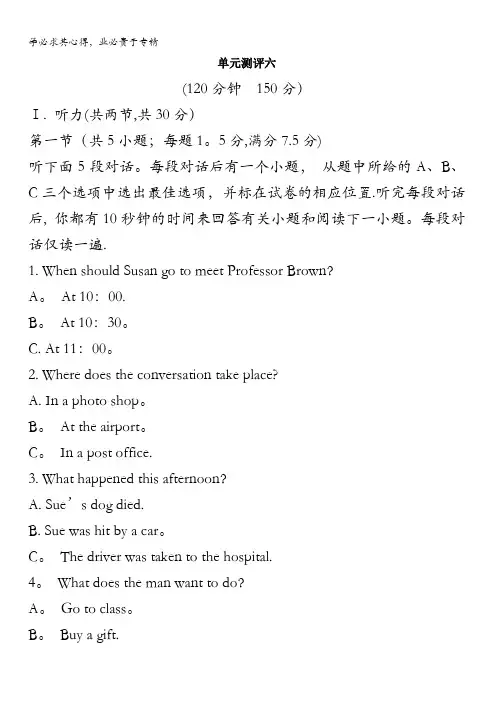
单元测评六(120分钟150分)Ⅰ. 听力(共两节,共30分)第一节(共5小题;每题1。
5分,满分7.5分)听下面5段对话。
每段对话后有一个小题,从题中所给的A、B、C三个选项中选出最佳选项,并标在试卷的相应位置.听完每段对话后, 你都有10秒钟的时间来回答有关小题和阅读下一小题。
每段对话仅读一遍.1. When should Susan go to meet Professor Brown?A。
At 10:00.B。
At 10:30。
C. At 11:00。
2. Where does the conversation take place?A. In a photo shop。
B。
At the airport。
C。
In a post office.3. What happened this afternoon?A. Sue’s dog died.B. Sue was hit by a car。
C。
The driver was taken to the hospital.4。
What does the man want to do?A。
Go to class。
B。
Buy a gift.C. Ask the way.5. What are they talking about?A. Seasons。
B。
Temperature.C。
Weather。
第二节(共15小题;每小题1。
5分;满分22. 5分)听下面6段对话或独白.每段对话或独白后有几个小题,从题中所给的A、B、C三个选项中选出最佳选项, 听每段对话或独白前, 你将有5秒钟的时间阅读各个小题;听完后,每小题将给出5秒钟的作答时间。
每段对话或独白读两遍.听第6段材料,回答第6~7题。
6。
Why did the man get a new TV?A。
He loved big televisions。
B. His old TV didn’t work well.C。
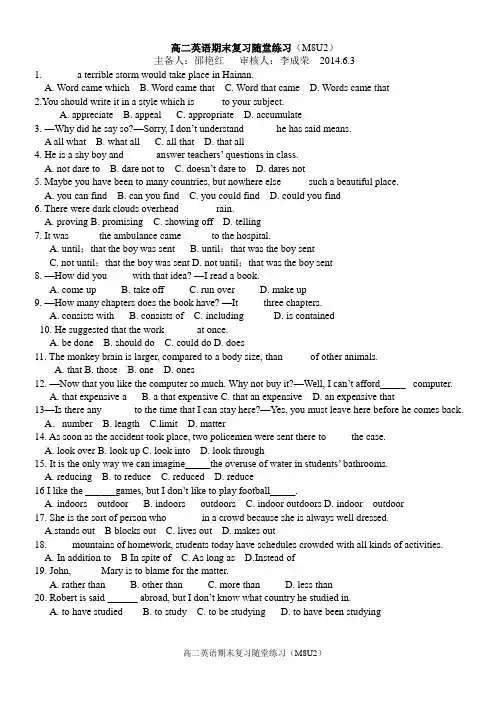
高二英语期末复习随堂练习(M8U2)主备人:邵艳红审核人:李成荣2014.6.31. ______ a terrible storm would take place in Hainan.A. Word came whichB. Word came thatC. Word that cameD. Words came that2.You should write it in a style which is _____to your subject.A. appreciateB. appealC. appropriateD. accumulate3. —Why did he say so?—Sorry, I don’t understand ______he has said means.A all what B. what all C. all that D. that all4. He is a shy boy and ______answer teachers’ questions in class.A. not dare toB. dare not toC. doesn’t dare toD. dares not5. Maybe you have been to many countries, but nowhere else_____ such a beautiful place.A. you can findB. can you findC. you could findD. could you find6. There were dark clouds overhead_______ rain.A. provingB. promisingC. showing offD. telling7. It was _____ the ambulance came _____ to the hospital.A. until;that the boy was sentB. until;that was the boy sentC. not until;that the boy was sentD. not until;that was the boy sent8. —How did you ____ with that idea? —I read a book.A. come upB. take offC. run overD. make up9. —How many chapters does the book have? —It ____ three chapters.A. consists withB. consists ofC. includingD. is contained10. He suggested that the work ______at once.A. be doneB. should doC. could doD. does11. The monkey brain is larger, compared to a body size, than_____ of other animals.A. thatB. those B. one D. ones12. —Now that you like the computer so much. Why not buy it?—Well, I can’t afford______ computer.A. that expensive aB. a that expensiveC. that an expensiveD. an expensive that13—Is there any______ to the time that I can stay here?—Yes, you must leave here before he comes back. A.number B. length C.limit D. matter14. As soon as the accident took place, two policemen were sent there to_____the case.A. look overB. look upC. look intoD. look through15. It is the only way we can imagine_____the overuse of water in students’ bathrooms.A. reducingB. to reduceC. reducedD. reduce16 I like the ______games, but I don’t like to play football_____.A. indoors outdoorB. indoors outdoorsC. indoor outdoorsD. indoor outdoor17. She is the sort of person who_______in a crowd because she is always well dressed.A.stands out B blocks out C. lives out D. makes out18._____mountains of homework, students today have schedules crowded with all kinds of activities.A. In addition to B In spite of C. As long as D.Instead of19. John, _____ Mary is to blame for the matter.A. rather thanB. other thanC. more thanD. less than20. Robert is said ______ abroad, but I don’t know what country he studied in.A. to have studiedB. to studyC. to be studyingD. to have been studying高二英语期末复习随堂练习(M8U2)。
浙江省金华市东阳市横店八校联考2024届九年级下学期开学考试英语试卷(含听力) 学校:___________姓名:___________班级:___________考号:___________
一、听力题 1.What does Frank's hometown produce? A.Silk. B.Tea. C.Cotton. 2.Whose dictionary are the speakers probably talking about? A.Jenny's. B. Bob's. C.Alan's. 3.What kind of music does Peter like? A.Rock music. B.Classical music. C.Country music. 4.How does Tom learn English? A. By reading books. B. By listening to tapes. C. By watching English movies. 5.Where does the conversation probably take place? A. In a bookstore. B. In a flower shop. C. In a clothes store. 听下面一段对话,回答下列各个小题。 6.What does Cindy think of the report? A.Amazing. B.Important. C. Interesting. 7.Which invention is the most useful? A. The telephone. B. The plane. C.The Internet. 听下面一段对话,回答下列各个小题。 8.What is Lisa like now? A. She has short hair. B.She is thin. C. She wears glasses. 9.How long has Lisa exercised in the sports center? A.For one year. B. For two years. C.For three years. 10.What might Jack do next? A. Talk with his friend. B.Write to his friend. C. Do exercise with Lisa. 听下面一篇短文,回答下列各个小题。 11.Where does Tony study now? A.In London. B.In New York. C.In Beijing. 12.Who did Tony go back to the neighborhood with? A.His family. B.His teacher. C.His classmate. 13.Why does Mr. Green like working as a shopkeeper? A. Because he loves folding clothes. B. Because he likes answering questions. C. Because he enjoys meeting new people. 14.When does Ms. King get up in the morning? A. At 7:30. B.At 8:30. C.At 9:30. 15.How does Tony like the people in his neighborhood? A. Friendly. B. Interesting. C. Humorous. 二、完形填空 Young Jim was glad when the ship finally arrived. He said 1 to his shipmates, carrying a heavy bag on his shoulder. With him was Ben. Jim 2 the old sailor(水手)on Treasure Island - he was a nice person, but had become a bit strange after being on the desert island for three 3 ! “What are you going to do now, Ben?” he asked. “A thousand pounds worth of treasure is 4 for me! I will live a happy life!” He waved goodbye as he 5 . The minute Jim got home, his mother rushed outside. “Oh, my darling boy ! It’s so good to see you --- I thought you had been lost at sea!” she cried 6 . Jim showed her the one thousand pounds worth of treasure 7 made. She was amazed! More than 8 weeks later, while Jim was helping his mom with dinner, Ben appeared in front of him. “Bad luck, Jim ! The 9 weighed me down, and there were so many things to spend it on. In fifteen days, I had lost every coin!” Ben said. This was a sad turn of events! Jim asked Ben if he had any family he could 10 with. He sighed. “I've been on that island for years, so I've forgotten so many things. I wouldn't know where to find them ! I couldn't 11 tell you when my birthday might be!” Jim felt sorry for him ! He went into the kitchen and came out with a 12 . Jim told Ben, “ 13 you don't know when your birthday is, let's say it's today !” When Ben tore(撕破) the paper off the box and smelled what was 14 it, a tear came to his eye. “A CHEESE CAKE! The very thing I missed on that island for so many years. You’ve taught me a 15 --- Gold coins come and go, but friendship is a treasure that lasts forever! ” 16.A. hello B. sorry C.thanks D. goodbye 17.A.met B. hugged C. caught D.interviewed 18.A. days B.weeks C. months D. years 19.A. short B. enough C. healthy D. famous 20.A. gave up B. fell down C. walked off D. woke up 21.A. slowly B. quietly C. excitedly D. nervously 22.A.it B. he C.she D.we 23.A.two B.three C. four D. Five 24.A. work B. pain C. family D. treasure 25.A. help B. stay C. deal D. play 26.A. only B.yet C. even D.still 27.A. toy B.box C. book D. flower 28.A. Until B. Unless C. Since D.Before 29.A.in B.on C. under D.behind 30.A. lesson B.decision C. choice D. secret 三、阅读理解 Jackie is writing a summary and feedback about School Day to his teacher. Summary: School Day was held successfully on May 6th. Twenty-four student helpers from Grade 8 were divided into four groups. Each group had a task to raise money for the children in poor areas. Group 1 Group 2 Group 3 Group 4